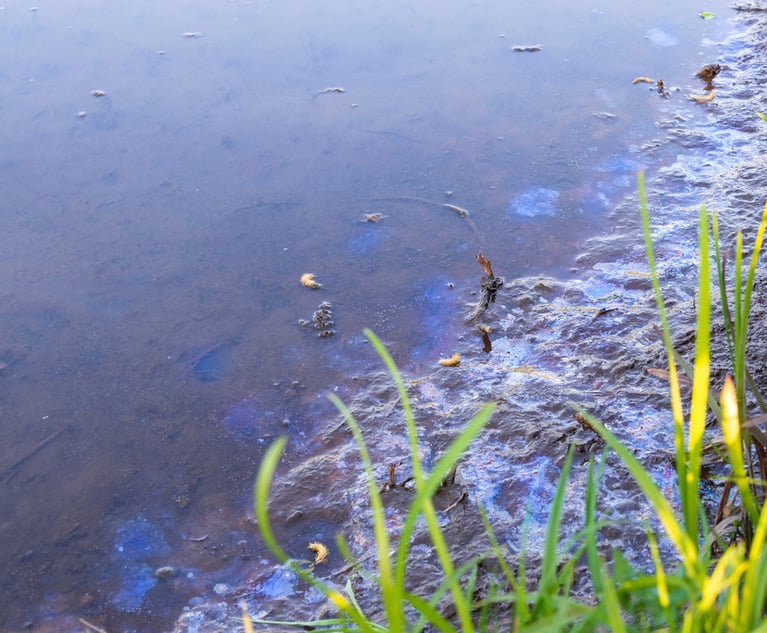
Still No Party: Permit Objectors Continue to Be Denied a Fair Process
Owners of property adjoining a property that is the subject of an administrative permit review have no real ability to raise concerns regarding the permit and to create an administrative record which might defeat an improperly issued permit and to protect their property.
September 02, 2021 at 11:00 AM
8 minute read
An improperly issued permit from the New Jersey Department of Environmental Protection (DEP) to fill wetlands may lead to the flooding of nearby properties. An application for a waterfront development permit may negatively impact local fishing or tourism, or create pollution or noise issues for nearby property owners. Neighboring property owners are often in the best position to raise such allegations and to offer evidence to support them in an administrative permit review process. However, under the current state of the law, these non-applicant property owners have no real ability to raise these concerns and to create an administrative record which might defeat an improperly issued permit and to protect their property.
By way of background, nearly three decades ago, in 1992, State Assemblyman Robert C. Shinn, Jr. (who later served as the Commissioner of the DEP from 1994 to 2002) introduced a bill concerning the ability of a third party to appeal a permit decision from a State agency. 1992 N.J. A.N. 1561. The bill became law in 1993 as an amendment to the Administrative Procedure Act (APA), and provides that no State agency may "promulgate any rule or regulation that would allow a third party to appeal a permit decision." N.J.S.A. 52:14B-3.3.
In 2010, more than 10 years ago and nearly two decades from the enactment of that statutory amendment, one of the authors of this writing contributed an article for this publication, discussing the difficulty that anyone other than an applicant had in administratively contesting a permit. Stuart J. Lieberman and Shari M. Blecher, "It's No Party for Third Parties," 200 N.J.L.J. 1, 1-2 (2010). Today, it is still not time to open the Champagne bottle. Our courts continue to steadfastly uphold hearing request denials by State agencies. In fact, these authors have been unable to find any case—over the course of almost 30 years—holding that a hearing request by a non-applicant was improperly denied.
This content has been archived. It is available through our partners, LexisNexis® and Bloomberg Law.
To view this content, please continue to their sites.
Not a Lexis Subscriber?
Subscribe Now
Not a Bloomberg Law Subscriber?
Subscribe Now
NOT FOR REPRINT
© 2024 ALM Global, LLC, All Rights Reserved. Request academic re-use from www.copyright.com. All other uses, submit a request to [email protected]. For more information visit Asset & Logo Licensing.
You Might Like
View All
She May Take the Bench: Appellate Division Sides With Prosecutor in Pension Dispute
4 minute read
Indemnification of Board Member-Plaintiffs Must Be Expressly Stated, NJ Supreme Court Says
6 minute read
Letter to the Editor: Response to Recent 'Chevron' Deference Piece

New Jersey's Experience Shows That 'Chevron' Deference Not Essential to the Administrative State
7 minute readTrending Stories
Who Got The Work
Michael G. Bongiorno, Andrew Scott Dulberg and Elizabeth E. Driscoll from Wilmer Cutler Pickering Hale and Dorr have stepped in to represent Symbotic Inc., an A.I.-enabled technology platform that focuses on increasing supply chain efficiency, and other defendants in a pending shareholder derivative lawsuit. The case, filed Oct. 2 in Massachusetts District Court by the Brown Law Firm on behalf of Stephen Austen, accuses certain officers and directors of misleading investors in regard to Symbotic's potential for margin growth by failing to disclose that the company was not equipped to timely deploy its systems or manage expenses through project delays. The case, assigned to U.S. District Judge Nathaniel M. Gorton, is 1:24-cv-12522, Austen v. Cohen et al.
Who Got The Work
Edmund Polubinski and Marie Killmond of Davis Polk & Wardwell have entered appearances for data platform software development company MongoDB and other defendants in a pending shareholder derivative lawsuit. The action, filed Oct. 7 in New York Southern District Court by the Brown Law Firm, accuses the company's directors and/or officers of falsely expressing confidence in the company’s restructuring of its sales incentive plan and downplaying the severity of decreases in its upfront commitments. The case is 1:24-cv-07594, Roy v. Ittycheria et al.
Who Got The Work
Amy O. Bruchs and Kurt F. Ellison of Michael Best & Friedrich have entered appearances for Epic Systems Corp. in a pending employment discrimination lawsuit. The suit was filed Sept. 7 in Wisconsin Western District Court by Levine Eisberner LLC and Siri & Glimstad on behalf of a project manager who claims that he was wrongfully terminated after applying for a religious exemption to the defendant's COVID-19 vaccine mandate. The case, assigned to U.S. Magistrate Judge Anita Marie Boor, is 3:24-cv-00630, Secker, Nathan v. Epic Systems Corporation.
Who Got The Work
David X. Sullivan, Thomas J. Finn and Gregory A. Hall from McCarter & English have entered appearances for Sunrun Installation Services in a pending civil rights lawsuit. The complaint was filed Sept. 4 in Connecticut District Court by attorney Robert M. Berke on behalf of former employee George Edward Steins, who was arrested and charged with employing an unregistered home improvement salesperson. The complaint alleges that had Sunrun informed the Connecticut Department of Consumer Protection that the plaintiff's employment had ended in 2017 and that he no longer held Sunrun's home improvement contractor license, he would not have been hit with charges, which were dismissed in May 2024. The case, assigned to U.S. District Judge Jeffrey A. Meyer, is 3:24-cv-01423, Steins v. Sunrun, Inc. et al.
Who Got The Work
Greenberg Traurig shareholder Joshua L. Raskin has entered an appearance for boohoo.com UK Ltd. in a pending patent infringement lawsuit. The suit, filed Sept. 3 in Texas Eastern District Court by Rozier Hardt McDonough on behalf of Alto Dynamics, asserts five patents related to an online shopping platform. The case, assigned to U.S. District Judge Rodney Gilstrap, is 2:24-cv-00719, Alto Dynamics, LLC v. boohoo.com UK Limited.
Featured Firms
Law Offices of Gary Martin Hays & Associates, P.C.
(470) 294-1674
Law Offices of Mark E. Salomone
(857) 444-6468
Smith & Hassler
(713) 739-1250






